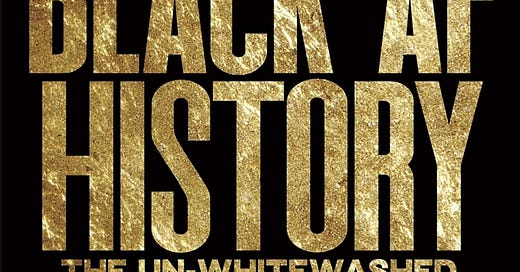Michael Harriot's 'Black AF' is the most delightful way to read even the darkest parts of American history
From comedy to combating myths, this is my (second) favorite black history book
Update on October 10, 2024: I have no idea why I slept through this podcast for two straight years, but I swear I wish somebody would’ve recommended it to me. I’ve added every single episode to my listening library. In between listening to Lupita Nyong’o’s podcast “Mind Your Own,” I’m catching up on these segments from Michael Harriot.
Original Review on July 7, 2024: I don't recall how I first heard about Michael Harriot’s “Black AF.” (Initially, I thought of Kenya Barris’ Netflix show, which I watched at least three times.) I just recall a podcast host recently talking about how it was a mix of black history and comedy that definitely appealed to African-American readers. From the first couple of pages, I quickly agreed.
ADVERTISEMENT ~ Amazon
As an Amazon affiliate, I earn a percentage from purchases with my referral links. I know some consumers are choosing to boycott Amazon for its DEI removal. However, after thinking about this thoroughly, I want to continue promoting cool products from small businesses, women-owned businesses and (specifically) Black-owned businesses who still feature their items on Amazon. As of the first date of Black History Month 2025, each new post will ALWAYS include a MINIMUM of one product sold by a Black-owned business. (I have visited the seller’s official site to verify that Amazon Black-owned logo.) I am (slowly) doing this with older, popular posts too. If you still choose to boycott, I 100% respect that decision.
When I say this, I don't mean writers who think they can appeal to black readers. I mean this book is written for folks who can code-switch so fast that we may as well be considered bilingual. There are a ginormous amount of inside jokes, so many IYKYK moments and quite a bit of "I know that's right!" shouting at paper.
I planned to keep checking the book out at a library and skip around for good content. I considered myself reasonably savvy at black history. Now I’m thinking it’s more like 70/30. I started re-reading the same pages over and over again, including Harriot’s own childhood stories. (Why am I ready to fight to get Harriot's winter coat back?)
I'm having a tough time getting to the next chapter because I keep re-reading to enjoy the previous one all over again. After I’d renewed “Black AF” twice, I realized it would take me forever to finish 420+ pages. I bought the audiobook and was relieved that it was in the author's voice.
Recommended Reads: “Shamontiel’s Bookshelf”
Critics of Critical Race Theory may faint from all these historical facts, including a fair counterargument to the “Africans had slaves too” retort — with a dark humor joke about one of Ray J’s songs that was (sadly) on point. While anti-CRT opponents will surely try to ban this book in any classroom and are throwing tantrums as I type, I’ve been doing the happy dance over the past month while reading this book.
Even with an audio version, I’m re-listening to chapters, stopping to read articles from the additonal PDF and taking way too long to get to the end. I've re-listened to the history of Juan Garrido (Black Mexican who should have Christopher Columbus' "holiday"), the entire billion-dollar robbing from the Haitian Revolution and the story of the Maroons multiple times.
I edited a children's book about Queen Nzinga of Ndongo before, and there were definitely some "adult" details missing that made me re-listen to Harriot’s take on the queen a couple more times.
Besides Harriet Tubman, the $168.62 chaos to capture "Joe" may be the most impressive slave rebellion story I've ever read. Describing Joe as "if Angela Davis had a baby with T'Challa and gave it up for adoption to be raised by Tupac" sounds exactly right.
Recommended Read: “I miss Black Expressions Book Club ~ IDSC ‘BlackTechLogy’ December Exclusive: There's nothing like strolling into black bookstores”
The story of the Igbo Landing and the mass suicide at Dunbar Creek gave me chills: "The Water Spirit brought us; the Water Spirit will take us home."
I could keep going. This is just the first five chapters, and I left out about 65% of the other history lessons. Eventually, I'll get to the end of this book. There's next to no chance that “Black AF” won't maintain its 5-star review. So just assume I love the second half as much as I do the first half, and get your copy today.
---------------
Update on October 10, 2024: I am standing by my five-star rating. One chapter on hanging, beatings and torture just reminded me too much of my sixth-grade class watching and reading "Roots." I couldn't wait for the graphic detail to be over with. It was significant and should be documented, but because I already knew it, I was cringing to re-learn it again. This doesn't make me any less supportive of CRT, but I do understand the guilt some must have learning the real history that happened.
The rest of the book was solid, but I stand by the first half being the highlight for me. I think because I had such quality African-American history teachers in elementary school that the latter half was not as interesting to me. It would have been if I had never been taught this information. The first half was full of information that I never learned. All around great listen/read. Highly recommended.
Did you enjoy this post? You’re also welcome to check out my Substack columns “Black Girl In a Doggone World,” “BlackTechLogy,” “Homegrown Tales,” “I Do See Color,” “One Black Woman’s Vote” and “Window Shopping” too. Subscribe to this newsletter for the weekly posts every Wednesday. Thanks for reading!





